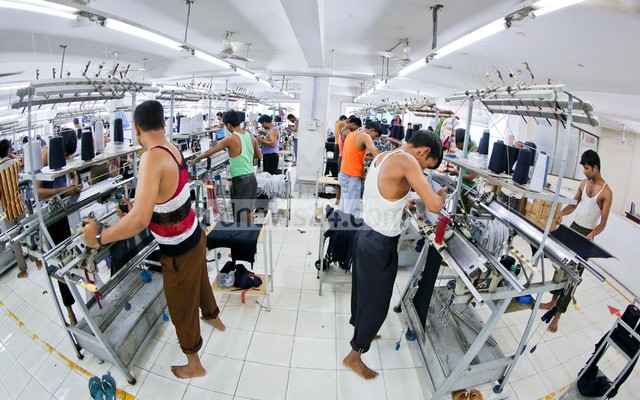The TIB report on corruption in the RMG sector lists (19) points. (13) are on the production part, and (3) are on the supply side. According to the report, corruption is endemic and involves all the players — local and foreign.
A summation of the list of corruption runs as follows:
- Compliance Inspectors are bribed to get favourable reports.
- Small factories bribe order givers to get work.
- Fake papers and documents are produced by factories.
- Factories bribe suppliers to get the right kind of orders.
- Merchandisers force factories to buy accessories of their choice.
- Importing extra goods than required which are then sold in the open market
- Illegal cashing in on back to back LCs by factories.
- Violation of rules on minimum wages, workers hours, and labour laws.
- Buyers force factories to comply with many extra order work and advantages
- Illegal sub-contracting by factories
- Bribing SSC inspectors
- Arbitrary cancelling of orders by the buyers
- Changing/ altering of compliance report by the buyers
- Avoiding quality control issues by bribing
- Bribe seeking by Inspectors
- False information provided by buyers to change ports of destination to avoid landing fees
A casual glance will show that these are general charges and don’t really imply that sector leaders are all part of a criminal conspiracy. Nor does it mean that the TIB has been trying to frame the sector and create an impression that RMG factory owners are all corrupt and cheats.
If anything, it’s one of the few reports that state that international buyers are as much at fault in encouraging and conducting corruption just as much as locals.
The report also points to the vulnerability of local producers who are often pushed to take decisions that are byproducts of the lack of control over the process: From accessing raw materials to shipping to consumers. Point by point, it is also a description of how money, influence peddling, and arm-twisting all play a role in this global labour-intensive business.
BGMEA and BKMEA’s reaction to the report is understandable, since the verdict is on the sector and not a particular agency responsible for corruption. Hence, it becomes a slur upon them all. The point is corruption is so ingrained in our economy, that it would have been a big shock if the sector was found to be free of it.
The RMG sector is Bangladesh’s largest industrial sector and employs 4 million+ workers. If one takes the contingent industries into account, the number would rise further. Given that, it’s a very significant one as 80% of the workers are women but few earn decent wages. That is an important aspect of the matter and the systemic corruption is important. Yet we are not becoming any less corrupt tomorrow, if ever. Maybe workers need a few people to speak for a better future for them.
While on the matter of corruption, the situation in the banking sector is much more alarming and at least three banks have been mentioned recently which have been giving very dodgy loans and practicing what can be termed even at its strictest description, as “corruption”.
Perhaps the state of the scenario can be best described by the Farmers Bank example, headed by ex-AL Minister MK Alamgir, where the Bangladesh Bank (BB) was forced to put an Observer in place to avoid future disasters. BB has, however, not said what will happen to the bad loans.
But MK Alamgir is not one to take things lying down, and he is now trying to initiate an inquiry into the Bangladesh Bank. And as a parliamentary committee member, he has a high degree of immunity and added power. So if the banking sector is in such a shape, can one blame the RMG sector which more or less runs without any statutory supervision?
But it would have been better if TIB had done two things before producing this report:
- A) Met the BGMEA and BKMEA and raised the issues with them and added their responses to the report.
- B) Explained the matter of sampling and why the 70+ factory samples were adequate as a representative number to do a qualitative analysis of a particular problem like corruption.
It also would have been great if the RMG factory owners had not attacked TIB but given a point by point rebuttal of the issues raised. It has called the report as a “conspiracy against Bangladesh” and the RMG sector for which there is no evidence.
Everyone knows corruption is endemic and in the RMG sector with many players of many lands playing, this is only to be expected. Had they taken the suggestions seriously and promised to act upon it, BGMEA credibility would have increased.
Right now, it looks more powerful than correct. In a country where might is right, this is fine but a future awaits all international business and for the Bangladesh RMG-wallahs, it is no different.
It would have been best if the Commerce Minister Tofael Ahmed had not suggested that TIB be sued at a meeting organised by the BGMEA. It makes him look like a “friend “of the BGMEA and not the general electorate. The party in power belongs to the voters and not the garments sector.
Close proximity to business lobbies are never politically smart, no matter how many members of the parliament and the ruling parties are members of this particular business lobby.
One knows that the minister is angry with the TIB for its parliamentary report when suing TIB was also suggested, but that is all the more reason why he should have stayed neutral and objective. National politics demands it be so or TIB by default may become a moral substitute of the voice which politicians should be having.
Source: bdnews24

